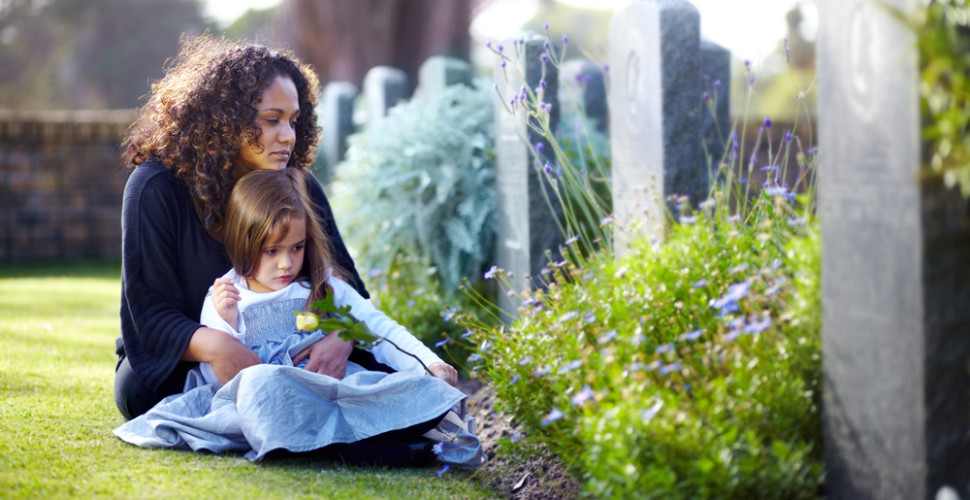05/02/2019 | Natalie Jewitt
Talking about Death

We don’t often talk about death as adults so it’s not surprising that as parents we can sometimes feel at a loss as to how to talk to our children about death. Death can often happen suddenly, catching us off guard, and therefore leaving little time for us to think about how best to talk to our children about the loss of a loved one, so I thought I would write this blog for you to read now and store for when you reach a time that it will be useful.
One thing is for sure we cannot protect our children from death as we encounter death all the time, whether it’s a grandparent dying, a family pet dying, a famous person we hear about on the radio or a mouse being brought in by the cat! At an early age children form their own beliefs and thoughts about death, so it’s important we are honest, clear and keep things simple. By the age of seven or eight, many children understand that death is permanent and that it happens to everyone. Despite this understanding it can still be a struggle to get to grips with the idea, in the same way that it is for many adults.
If possible it can be good to help your child have an understanding of death, funerals, burial and cremation before actually experiencing the death of a loved one. When a pet dies it can often be a child’s first experience of death, through this experience children can learn that death is incredibly sad, but we absolutely can talk about it, share and express our feelings and unite together in our sadness. It’s ok if you don’t have all the answers to your child’s questions, it’s far better to talk about that and explain that you don’t know rather than ignoring the question. By discussing their questions, even when you don’t know the answer, you are letting your child know that it is totally okay to ask.
A few tips:
- Talk about death. Children need to know that dead and death are not scary words. Talk about death as a part life and how life and death go together. Use the natural world to highlight that all things die including flowers and leaves.
- Other resources. There are many books available for children that talk through death – I will post some on Jenby’s Facebook page shortly. When death is incorporated into a programme your child watches don’t shy away from talking about it, instead use it as an opportunity to talk about death. Not so long ago my daughter and I were watching Bing and in this one episode Bing accidently squashed a butterfly and it dies. By talking about this with my daughter we were able to chat more about death and she asked me a few questions that linked to her first experience of a pets death.
- Avoid any misleading words or information. Common terms such as “passed away” “lost” “Gone to sleep” can be confusing and misleading. It’s always best to use actual words like “death” and “dead” as these words are not misleading, they are clear and simple, therefore easier for children to understand. Interestingly young children will not have the same associations to these words as we do so it’s common for them to use those words freely and with ease, it’s often parents that can find those words more difficult. We also know that children benefit from having the cause of death explained to them in a sensitive and age appropriate way. Again by doing this in a simple and clear way your child can process what has happened and it also avoids a common misconception occurring whereby children feel they are to blame in some way for someone's death.
- Saying goodbye. When a loved one dies whether they are human or an animal we all need an opportunity to process this and say goodbye, children do too. For many parents It can be a difficult decision whether or not a child should attend a funeral or not. Funerals are a good way to help children (and adults) say goodbye so wherever possible it can be beneficial for children to be included in some way. I often say to my clients it doesn’t have to be all or nothing...A child can come along either before or after, they could make a card for you to take to the funeral, they could come for part of the service, or they could come to the whole day. Whatever you decide regarding the funeral, make sure your child has an opportunity to process the death, their feelings about this, say goodbye in some way (card, planting a tree, making a special memory book) and really importantly that they feel included and united with other family members.
Don’t be surprised if your child asks quite practical questions instead of talking about their feelings, this is totally normal, especially with younger children. Sometimes their questions may sound strange, know that this is their way of processing and making sense of death. Typical questions could be for example: “When you die where do you go?”, “Does it hurt when you die?”, “What’s it like inside a coffin?” or “What does a dead body really look like?”. These are entirely sensible things to wonder. It will be reassuring to a child if you are able to discuss them, rather than dismissing them as silly.
It is also important to highlight that children can feel many of the feelings that we feel as adults in response to a death, but they may express their feelings differently and jump from sadness to excitement very quickly. They may also need lots of little conversations about the death to help them make sense of what has happened and their feelings about this.
There are lots of useful advice, support and guidance available at Winston's Wish, which is a childhood bereavement charity – supporting bereaved children. More information can be found on their website: www.winstonswish.org.uk.
If you would like any further advice from one of our Clinical Psychologists at Jenby's or if you feel you or your child would benefit from additional support do get in touch for a free initial telephone discussion.
Bye for now!
Natalie

Article written by:
Dr Natalie Jewitt, CPsychol, BSc (Hons) DClin Psych

